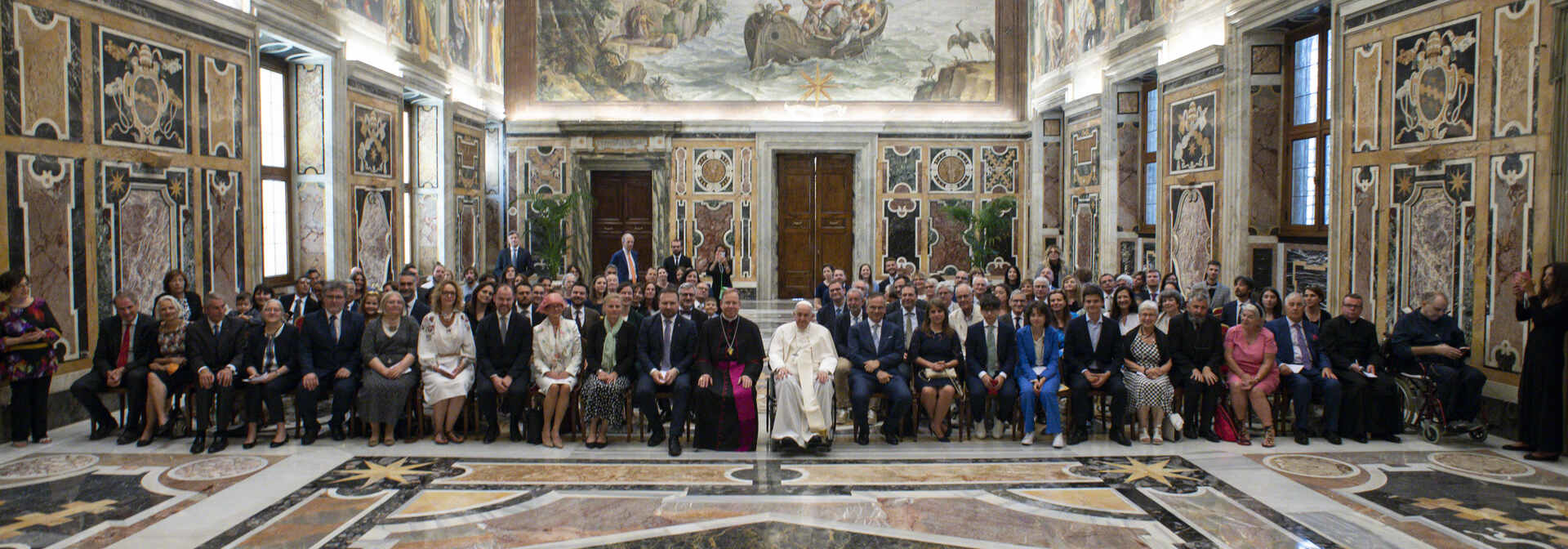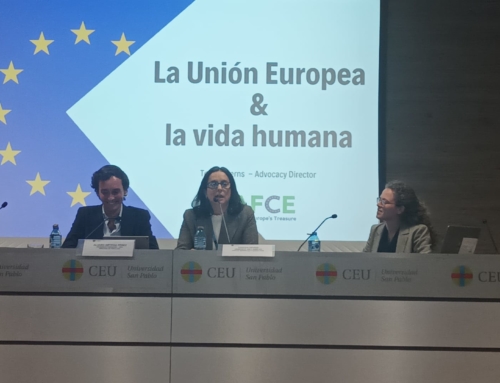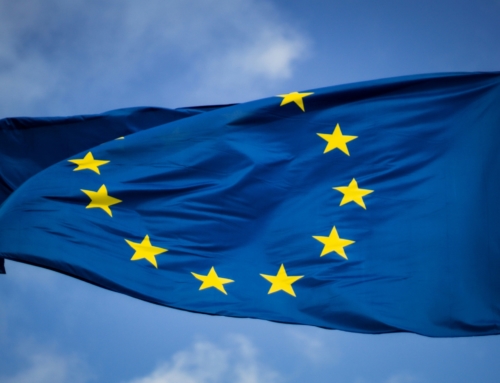14 June 2022,
European delegates and representatives of the 32 FAFCE Members gathered in Rome on the 10th of June 2022 to celebrate the XXV Anniversary of the Federation. FAFCE President, Vincenzo Bassi, opened the audience with Pope Francis:
“Holy Father,
Five years have passed since our last meeting with you. Five years ago, you invited us to be a “Church which goes forth”, to leave our offices, thus making our associations more and more welcoming “homes”, and less like “apartments”, that are far from the reality of our communities.
A lot has happened in these past years. Our Federation even risked ceasing its activities. We have experienced an acceleration of the epoch change, which you often speak to us of, at all levels. Exasperated consumerism and individualism, as well as nationalism (as unfortunately we are seeing in these months of war) represent our challenges, to which we wish to respond not defensively, with sadness, but joyfully witnessing the responsible beauty of family love, Amoris Laetitia, as the Church invites us to do, in this year of the family and with this imminent World Meeting of Families.
And then, wanting to start from our experience without ideologies, we say that, if it is true that the family, like the Church, pursues not uniformity but the unity in complementarity of its members, it is equally true that forgiveness and reconciliation are experiences that are impossible to live in solitude – loneliness which therefore represents the greatest disease of our time, to be treated together with families.
Your Holiness, generating new life, offering forgiveness to one another, caring for the frail, the lonely, the elderly, the poor and immigrants should not be considered as acts of heroism, but as acts of natural generosity which has always been inherent to the responsibility of families. For this to happen, however, families cannot be left alone; they need communities of families who know how to create that quality in the interpersonal relationships that our grandparents lived in their villages. Only together are families truly generative, open to life, welcoming and missionary.
For this reason, FAFCE has the task of inspiring networks of families everywhere in Europe, and of bringing their voice to the level of the national, European and international institutions. Also, because families are not the terminally ill of our society; on the contrary, changing the metaphor, families are the trunk of a tree that bears fruit. Every family is a common good and family policies represent not a cost but an investment to guarantee the future of our societies!
Today, Your Holiness, families from all social backgrounds, workers, employees, grandparents, housewives, practitioners, entrepreneurs have come here to meet you and to thank you; also politicians such as the Minister of Labor, Social Affairs and the Family of the Czech Republic, Marian Jurečka, who in the coming months will be called to chair the Council of the European Union meetings that will deal directly with our issues.
And yes, we want to say it strongly: family associations represent society as a whole and not only a part of it, like any trade association, party or trade union.
Of course, our families and associations are not models of perfection, everyone has their own shortcomings, yet all are on the way, with generosity and responsibly: imperfect representatives of imperfect families; a journey that is sometimes difficult, but travelled in the awareness of not being alone, like a flock with its shepherd. In this sense, FAFCE carries out its service in communion with the Pastors of the local Churches. Your Holiness, they are well represented here today by H.E. Mons. Gintaras Grušas, Archbishop of Vilnius and President of the Council of European Bishops’ Conferences (CCEE).
In this sense, the current synodal journey seems providential to us, because it allows us to live this time of epochal change, – as you yourself teach us, Your Holiness – helping to strengthen the reality of a Church understood as a community of families with the shepherds at the centre.
Thank you, Holy Father. Thank you for this meeting today and thank you for your words. Thank you also for your attention to this tired Europe of ours that no longer has children and that needs, especially in a time of war like this, an urgent injection of maternal spirit, because no mother gives birth to a child to send him to war! Also for this reason, thank you, Holy Father, precisely for having placed the family at the centre of your Petrine ministry, from the very beginning. In doing so, you put the person at the centre, in the ordinary life in which all of us Christians are called to live our vocation. Please rest assured of our support and our prayers. Thank you again.”
FAFCE Board and delegates then received beautiful words of encouragement by Pope Francis:
ADDRESS OF HIS HOLINESS POPE FRANCIS
TO DIRECTORS OF THE FEDERATION OF
CATHOLIC FAMILY ASSOCIATIONS IN EUROPE
Clementine Hall
Friday, 10 June 2022
The Urgent Need to Develop Family Networks
for the Future of Europe and the Universal Church
Dear brothers and sisters, good morning and welcome!
I thank the President for his words of greeting and introduction. This is a jubilee meeting: you are commemorating the twenty-fifth anniversary of your foundation, and it is good to celebrate and give thanks. Sadly, at this moment Europe, and especially families in Europe, are undergoing tragic and dramatic experiences as a result of the war in Ukraine. I can only endorse your statement that “mothers and fathers, regardless of their nationality, do not want war. The family is the school of peace” (FAFCE Presidency Council, 6 May 2022). Indeed, families and family networks have been and continue to be at the forefront of welcoming refugees, particularly in Lithuania, Poland and Hungary.
In your daily efforts to assist families, you provide a twofold service: you make their voice heard in the European institutions and you work to form networks of families across the continent. This mission is in full harmony with the synodal path on which we have embarked, in order to make the Church ever more a family of families.
I thank you for the seminar that you organized in cooperation with the Dicastery for the Laity, the Family and Life, centered on bearing witness to the beauty of the family. In advance of the World Meeting of Families, which will take place in a few days’ time, it calls our attention to the low birth rates in Europe and especially in Italy. This demographic winter is very serious. Please, be attentive to it! There is a very close link between this regenerative poverty and the loss of a sense of the beauty of the family: “Witness to the social dignity of marriage will become persuasive precisely by being a witness that is attractive” (Catechesis, 29 April 2015).
I also renew the encouragement I gave to you five years ago (1 June 2017) and I encourage you to continue your work of encouraging the creation and consolidation of family networks. This is a valuable service, because there is a need for places, gatherings and communities where couples and families feel welcomed, accompanied, and never alone. There is an urgent need for the local Churches, both in Europe and beyond, to encourage the work of the laity and families who accompany families.
It is clear that we are living in an era of change, but even more, a change of era. Your work is being carried out amid this change, and that can sometimes lead to a sense of discouragement. Yet by God’s grace, we have been called to keep working with confident hope and in effective communion with the Church. I think in this regard of the Memorandum of Understanding signed last year by your Federation with the Council of European Bishops’ Conferences and your cooperation with the Commission of the Episcopates of the European Union, in whose Brussels offices your General Secretariat is located.
The challenges are great and they are all interconnected. Today, for example, “we can no longer speak of sustainable development apart from intergenerational solidarity” (Laudato Si’, 159). This solidarity presupposes a balance; but it is precisely this balance that is lacking in our Europe today. An aging Europe that is not reproducing is a Europe that cannot afford to talk about sustainability and finds it more and more difficult to be solidary. For this reason, you have often pointed out that family policies should not be considered expressions of state power, but be based in primis on concern for families themselves. States have the task of eliminating obstacles to larger families and recognizing that family is a common good to be rewarded, with natural positive consequences for all.
Furthermore, as a recent Resolution of yours observed, “having children should never be considered as a lack of responsibility towards creation or its natural resources. The concept of ‘environmental footprint’ cannot be applied to children, since they are an indispensable resource for the future. Instead, consumerism and individualism should be addressed, looking at families as the best example of the optimization of resources involving large economies of scale” (FAFCE, Families for Sustainable and Integral Development, 26 October 2021).
We should also speak about the scourge of pornography, which has everywhere burgeoned due to the internet, can only be condemned as a continuing attack on the dignity of men and women. It is a matter not only of protecting children – an urgent task of the authorities and of all of us – but also of declaring pornography as a threat to public health. “We would be seriously deluding ourselves were we to think that a society where an abnormal consumption of internet sex is rampant among adults could be capable of effectively protecting minors” (Address to the Participants in the Congress on “Child Dignity in the Digital World”, 6 October 2017). Networks of families, in cooperation with schools and local communities, have an essential role to play in preventing and combatting this plague, and in bringing healing to those trapped in the maelstrom of addiction.
The dignity of men and women is also threatened by the inhuman and increasingly widespread practice of the “rented uterus”, in which women, almost always poor women, are exploited and children treated as commodities.
Your Federation is rightly responsible also for bearing witness to unity and working for peace – may it be peace in abundance – at this time in history when, sadly, it is under grave threat, and where there is great need to focus on what unites rather than on what divides. In this regard, I am grateful that in the last five years your Federation has expanded to welcome ten new family organizations and four new European countries, including Ukraine.
Finally – and this is perhaps the challenge underlying all others – the pandemic has highlighted another, more hidden pandemic, about which little is being said: the pandemic of solitude. While many families have rediscovered their identity as domestic churches, it is also true that all too many families have felt isolated and their relationship with the sacraments has become in many cases purely virtual. Family networks are an antidote to solitude and isolation. Indeed, by their very nature, they are called, in communion with the pastors and local Churches, to leave no one behind.
“The mutual love between man and woman is a reflection of the absolute and unfailing love with which God loves the human being, destined to be fruitful and to find fulfilment in the common work of the social order and the care of creation” (Address to Participants in the Plenary Session of the Pontifical Academy of Social Sciences, 29 April 2022). The family founded on marriage is therefore crucial. It is the primary cell of our communities and must be recognized as such, in its unique and indispensable regenerative function. Not because it is an ideal and perfect entity, and not because it is an ideological model, but because it represents the natural place of our first relationships and of regeneration. “When a family is welcoming and reaches out to others, especially the poor and the neglected, it is a symbol, witness and participant in the Church’s motherhood” (Amoris Laetitia, 324).
Dear brothers and sisters, keep moving forward in your service! Please, ensure that the organization is all about service, streamlined and ever ready to respond to the demands of the Gospel. May the Lord bless you and may Our Lady keep you. I bless you all from my heart, and I ask you to please pray for me. Thank you!









